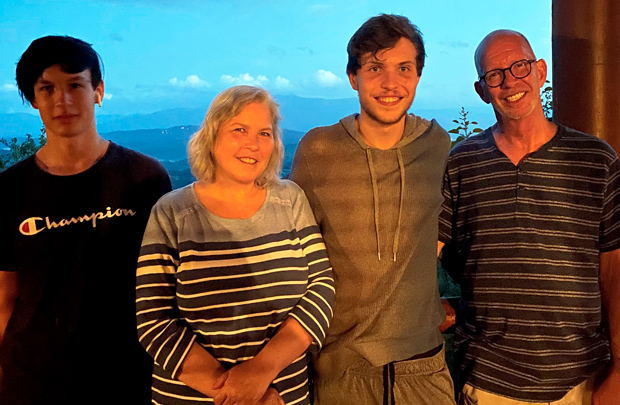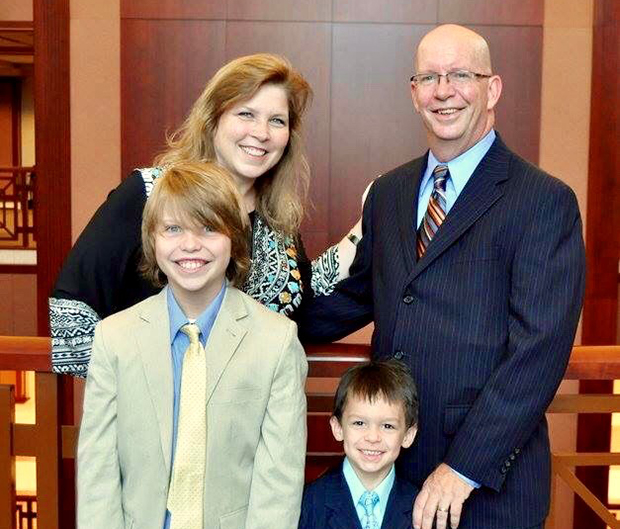
Lissa and Tim Bowen had always planned to adopt a child. While serving as a CASA volunteer, Lissa had learned about the need for families for children in foster care, and she shared that information with Tim. Together, they decided that when the time was right, adopting from foster care was the route they would take.
Twelve years ago, Lissa and Tim started the process of getting approved to adopt. They were licensed, and after a two-year search, were matched with the boy who would become their son, Alex. He was five years old and had experienced a tremendous amount of trauma in his short life.
“When we adopted Alex we already had a nine-year-old son by birth, Mitchell, and he was doing great. So thought, ‘We’ve got this! We know how to parent.’ But what worked with Mitchell didn’t work with Alex. In fact, it often seemed to make things worse,” Lissa said.

At the time, the effects of trauma on children were not as well understood as they are now, and therapies and training for families were not as widely available. In the early days, Lissa and Tim (as well as Alex and Mitchell) didn’t know how to respond to their son’s often challenging behaviors.
Lissa and Tim set out on what she describes today as a journey of learning about complex childhood trauma and how it impacts development, behavior, and relationships. She shared a few of the things she learned along the way with us.
Be an aggressive advocate
Though she was raised with the philosophy that you “catch more flies with honey,” Lissa quickly changed her style when it came to meeting her son’s needs—especially in the classroom.
When Alex was struggling in a large public school, Lissa and Tim identified funding that helped them pay for a private school where teachers were more familiar with trauma issues. And they took an active role in ensuring he was getting the support he needed.
“We educated ourselves about all of the acronyms and IEP language and we often brought Alex’s therapist with us to IEP meetings. I bet those administrators didn’t like to see us coming! I would take the day off from work and tell them: ‘We can stay here all day if we have to. We’ve got nothing but time, and we’re going to advocate for our kid.’ ”
Almost three years after Alex started in his trauma-informed private school, when the family moved to another state, Alex had the skills and confidence to transfer to a larger public school. Lucky for them, their special education staff had all been trained in trauma-informed education practices as well. Today, Lissa says, Alex is doing great.
“He went from acting out so that he could get in trouble and stay home to making friends and being a very good student. Once he got the services that he needed, he took off like a rocket!” Lisa said.
Seek out information and support—for you and your child
Lissa and Tim dedicated themselves to learning about the effects of trauma and how to help their son heal. As part of that journey, they worked with therapists and attend an annual Ties that Bind training conference for foster and adoptive families that is sponsored by the state of Georgia.
“Some therapists helped Alex, and some helped us help Alex. One of the biggest lessons we learned was the value of detaching—both for us and for our son. You can’t judge a child’s behavior. You can’t ask them ‘if’ or ‘why’ they did something wrong, because that puts them in a defensive position. You need to step back emotionally,” Lissa said.
“Were we always able to do that? Of course not! And like any parent, there are many moments I wish I could take back,” Lissa said.
Your entire family will change in ways you did not anticipate
When Lissa and Tim decided to adopt, their birth son, Mitchell, was excited to be a big brother. And while the first few years were “pretty tough,” today she says that they are as close as any siblings who have a four-year age gap between them.
“I tell people that in the beginning, they fought like strangers. Today, they fight like brothers,” Lissa said. “They’ve been through a lot, but I know both of our sons will be better men because of the way we put our family together.”
For Lissa and Tim, raising Alex has shaped their plans for the future. They recently completed their preservice training to get licensed to foster and adopt in their new state and are planning to focus their efforts on older kids who are at risk of aging out of care.
Tim is considering becoming an IEP coach to help other foster parents navigate the school systems. Lissa is a human resources recruiter, and when they retire, they are planning to open a small retail business where they can employ kids who’ve aged out of care, teaching them life skills and helping them get entry-level jobs.
“So many kids are aging out of care—more than 20,000 each year. They have no soft place to land. Now that we know that, how can we look at ourselves in the mirror if we don’t do something?”
Read more about understanding trauma on our website.